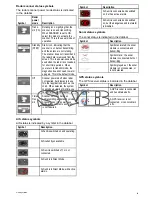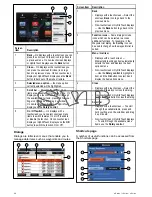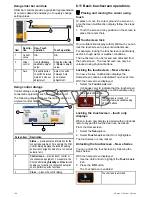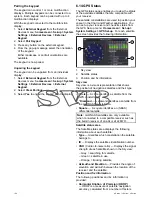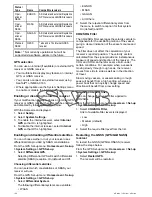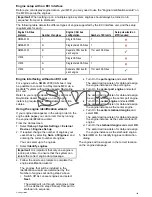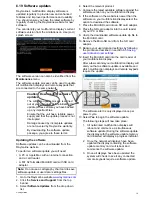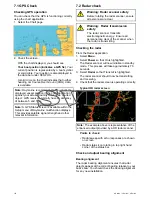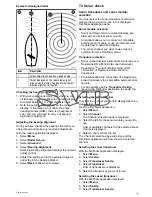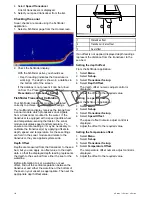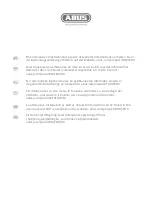
Status /
Type
Name
Compatible receivers
Oper-
ational
SBAS
EGNOS
All internal and external Raymarine
GPS receivers and GNSS receivers
Oper-
ational
SBAS
MSAS
All internal and external Raymarine
GPS receivers and GNSS receivers
Oper-
ational
SBAS
GAGAN
All internal and external Raymarine
GPS receivers and GNSS receivers
Planned
SBAS
QZSS
* a9x and a12x internal GNSS
receiver
Note:
* Not currently operational but will be
supported via software update in the future.
GPS selection
You can use an internal (if available) or external GPS
receiver or GNSS receiver.
• Your multifunction display may feature an internal
GPS or GNSS receiver.
• You can also connect an external receiver using
SeaTalk
ng
or NMEA 0183.
• Where appropriate use the System Settings menu
to enable or disable the internal receiver.
Enabling or disabling the internal receiver
If your multifunction display features an internal GPS
receiver or GNSS receiver then this can be enabled
and disabled by following the steps below.
With the Homescreen displayed:
1. Select
Set-Up
.
2. Select
System Settings
.
3. To enable the internal receiver, select
Internal
GPS
so that On is highlighted.
4. To disable the internal receiver, select
Internal
GPS
so that Off is highlighted.
Enabling and disabling differential satellites
You can choose wether or not your receiver uses
differential data provided by SBAS constellations.
From the GPS Set-up menu:
Homescreen > Set-up
> System Settings > GPS Set-up
:
1. Select
Differential GPS
.
Selecting Differential GPS will switch differential
satellite (SBAS) reception On (default) and Off.
Choosing differential satellites
You can select which constellations of SBAS your
receiver will use.
From the GPS Set-up menu:
Homescreen > Set-up
> System Settings > GPS Set-up
:
1. Select
Differential System
The following differential systems are available:
• WAAS
• EGNOS
• MSAS
• GAGAN
• All Others
2. Select the relevant differential system from
the menu to switch reception for that system
On (default) and Off.
COG/SOG Filter
The COG/SOG filter averages the velocity vectors to
compensate for the oscillating motion of the vessel,
giving a clearer indication of the vessel’s course and
speed.
The filter does not affect the calculation of your
receiver’s reported position. The velocity vectors
calculated from the signal provide an instantaneous
measure of speed and direction of the receiver. The
COG and SOG can therefor seem erratic under
certain conditions. For example, when a vessel is
moving slowly through rough seas, the receiver
moves from side to side as well as in the direction
of travel.
Slow moving vessels, or vessels sailing in rough
seas will benefit from a high setting, whereas a
power boat that can quickly change speed and
direction will benefit from a low setting.
Selecting COG/SOG filter
You can change the level of filter applied to
COG/SOG.
From the GPS Set-up menu:
Homescreen > Set-up
> System Settings > GPS Set-up
:
1. Select
COG/SOG Filter
.
A list of available filter levels is displayed:
• Low
• Medium (default)
• High
2. Select the require filter level from the list.
Restarting the GNSS (GPS/GLONASS)
receiver
To restart the GNSS (GPS/GLONASS) receiver
follow the steps below:
From the GPS Set-up menu:
Homescreen > Set-up
> System Settings > GPS Set-up
:
1. Select
Restart GPS
.
The receiver will be restarted.
106
a Series / c Series / e Series
Summary of Contents for A series
Page 2: ......
Page 14: ...14 a Series c Series e Series...
Page 41: ...13 GPS receiver 14 Thermal camera 15 Wireless connection Planning the installation 41...
Page 48: ...48 a Series c Series e Series...
Page 80: ...80 a Series c Series e Series...
Page 118: ...118 a Series c Series e Series...
Page 184: ...184 a Series c Series e Series...
Page 188: ...188 a Series c Series e Series...
Page 206: ...206 a Series c Series e Series...
Page 228: ...228 a Series c Series e Series...
Page 290: ...290 a Series c Series e Series...
Page 310: ...310 a Series c Series e Series...
Page 340: ...340 a Series c Series e Series...
Page 374: ...374 a Series c Series e Series...
Page 422: ...422 a Series c Series e Series...
Page 436: ...436 a Series c Series e Series...
Page 462: ...462 a Series c Series e Series...
Page 463: ......
Page 464: ...www raymarine com...


